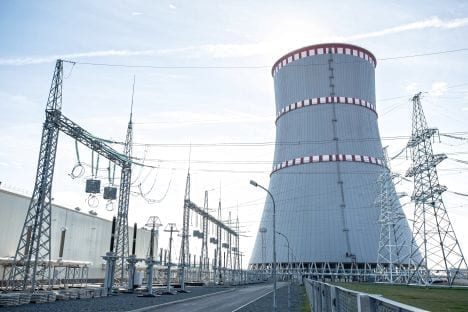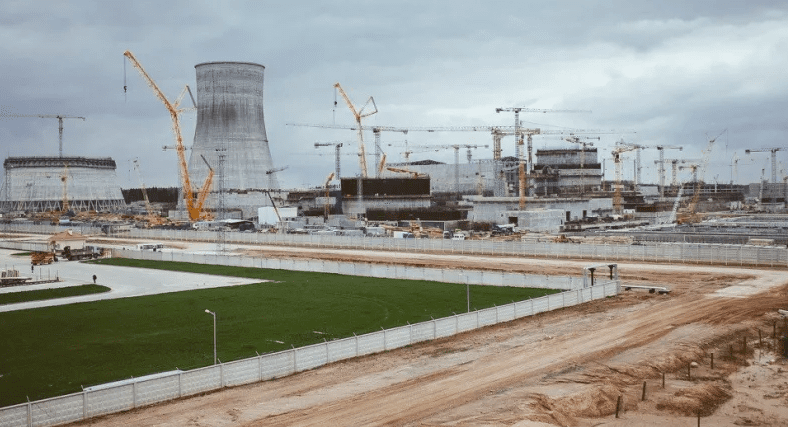Belarus Plant Loads Fuel; Second Reactor Set for 2022
The post Belarus Plant Loads Fuel; Second Reactor Set for 2022 appeared first on POWER Magazine.

Russian energy officials said they have begun loading fuel into the first reactor at the new Belarusian Nuclear Power Plant (NPP), while at the same time confirming plans for the start-up of a second reactor at the site in Astravets. The plant is the first nuclear power facility to be built in Belarus.
The project has moved forward despite fierce opposition from neighboring Lithuania, where officials have voiced safety concerns since work on the plant began in 2011. Vilnius, the Lithuanian capital, is about 30 miles from Astravets, and the Lithuanian government has said it will not import electricity from the plant due to national security concerns. Lithuania, along with Estonia and Latvia, also has considered placing fees on power imports from Russia due to the plant's construction.
Alexander Lokshin, the first deputy director general for operational management at Rosatom, Russia's state-owned nuclear company, on August 7 said a second reactor at the site is scheduled for completion in mid-2022. The plant is being built by Atomstroyexport, a Rosatom subsidiary.
Fuel loading of Unit 1 at the plant began Friday, and a total of 163 fuel assemblies are expected to be loaded by the end of August. Unit 1 is a VVER-1200 reactor (water-water energetic reactor), built using the Russian AES-2006 design, and the second reactor will be the same model. Each reactor will have 1,200 MW of generation capacity. Unit 1 is scheduled to enter commercial operation by the end of this year.
 Unit 1 (at left) of the Belarusian Nuclear Power Plant in Astravets, Belarus, is expected to come online by the end of 2020. The cooling tower for the unit is shown in this photo from 2016. Construction of Unit 2 at the plant is expected to be complete by mid-2022. Courtesy: DELFI
Unit 1 (at left) of the Belarusian Nuclear Power Plant in Astravets, Belarus, is expected to come online by the end of 2020. The cooling tower for the unit is shown in this photo from 2016. Construction of Unit 2 at the plant is expected to be complete by mid-2022. Courtesy: DELFIThe Republic of Belarus has become the owner of a power unit built according to the latest Gen 3+ technologies," Alexecy Likhachev, Rosatom general director, said in an email to POWER. This technology has been proved and tested through the operation of similar power units in Russia. They meet all the post-Fukushima safety requirements, and all the IAEA [International Atomic Energy Agency] missions have recognized their reliability. It is very important for us that we have built the first VVER-1200 unit abroad in the Republic of Belarus, a good neighbor of ours."
Officials in Belarus have repeatedly said the plant meets IAEA requirements, citing several inspections by the agency. Officials also said representatives of the European Commission and the European Nuclear Safety Regulators Group have overseen the project's construction.
Plant's Safety QuestionedDespite those assurances about the plant's safety, Lithuanian President Gitanas Nauseda on Friday called the plant a threat to our state's national security, public health and environment." Zygimantas Vaiciunas, Lithuania's energy minister, said he had warned the IAEA about what he called the Belarus government's haste to launch the project.
Lithuania, Latvia, and Estonia all want to decouple from their Soviet-era common power system by 2025.
Russian officials have said the Astravets plant will cost $10 billion. It is financed with a state loan that will be paid over a 25-year period.
We are building many nuclear power plant units across the globe and Belarusian specialists already participate in two construction projects of ours, the Kursk nuclear power plant in Russia and the Rooppur nuclear power plant in Bangladesh," Lokshin said in announcing the construction timeline for Unit 2.
Export of Russian TechnologyUnit 1 at the Belarus site is the first reactor of the newest Gen 3+ type using Russian technologies to be built outside Russia. There are units of that type currently operating in Russia-two at the Novovoronezh NPP, and one at the Leningrad NPP. Russian officials have said the VVER-1200, an upgrade from the previous VVER-1000 reactor, is not only more advanced but also safer, and will operate more efficiently, with a better economic profile.
Compared to the power units with the VVER-1000 reactor of the previous generation, the innovative Gen 3+ power unit with the VVER-1200 reactor has a number of advantages that significantly increase its economic performance and safety," Andrey Petrov, general director of the Rosenergoatom, and first vice president for nuclear power plant construction of the ASE Group, said in a statement shared with POWER.
Rosatom told POWER in a statement that the main feature of the VVER-1200 is a combination of active and passive safety systems that make the NPP fully resistant to external and internal influences. For example, all power units are equipped with a core catcher, a device provided to catch the molten core material of a nuclear reactor, as well as other passive safety systems capable of operating in complete power outage and without operators. In addition, the capacity of the power unit has increased by 20%, the number of maintenance personnel has been significantly reduced, and the design life of the main equipment has been doubled from 30 to 60 years with the possibility of extending it for another 20 years."
Belarus Wants to Reduce Reliance on Russian Natural GasThe nuclear power plant is a part of Belarus' energy strategy formulated over the past decade, as the country wants to reduce reliance on Russian-sourced natural gas, which today generates about 95% of the country's electricity. The Belarus energy plant also calls for construction of a 1,000-MW coal-fired plant, four hydropower stations with a total capacity of 120 MW, and wind projects totaling 300 MW.
Belarusian officials have said the plan, if fully implemented, would reduce the country's share of power generation from Russian natural gas to about 55%.
Rosatom told POWER that Atomenergomash JSC, the company's mechanical engineering division, is supplying all key equipment of the nuclear island for the Belarusian NPP. Fuel for the plant is produced at the Novosibirsk Chemical Concentrates Plant, which is part of TVEL, the Russian nuclear fuel cycle company that belongs to a Rosatom subsidiary. The fuel's enrichment level varies from 1.3% to 4.4%, according to Rosatom.
Rosatom told POWER that the company currently has 25 reactors under construction in nine countries, with an international order portfolio of 36 VVER units at different stages of implementation in 12 countries.
-Darrell Proctor is associate editor for POWER (@DarrellProctor1, @POWERmagazine).
The post Belarus Plant Loads Fuel; Second Reactor Set for 2022 appeared first on POWER Magazine.